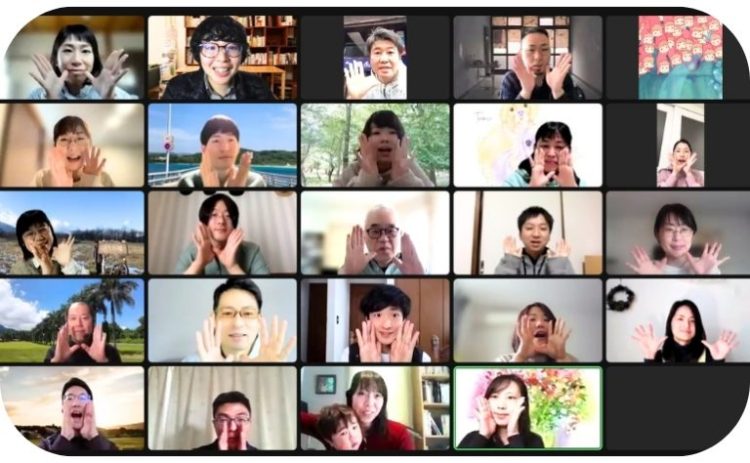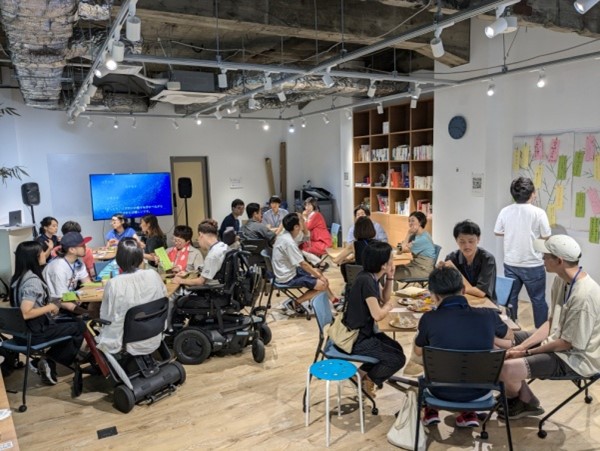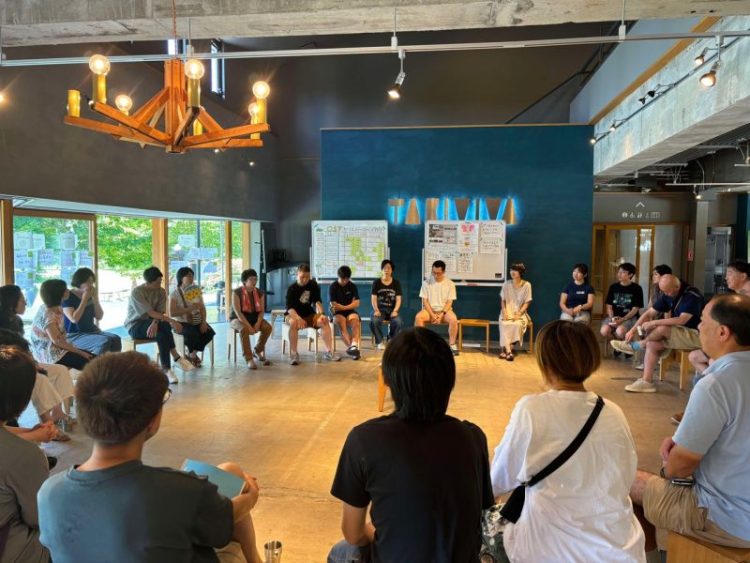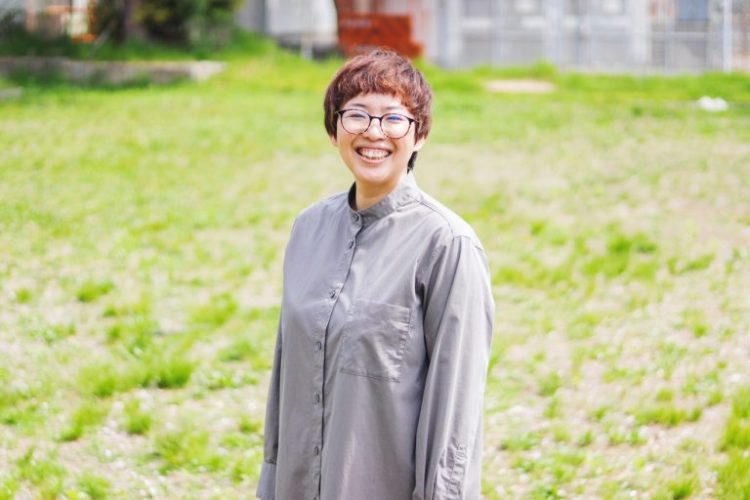An NPO project I came across while reflecting on teacher shortages after leaving my teaching job InsightsEssays: Civil Society in Japan
Posted on November 19, 2024
Japan NPO Center (JNPOC) has a news & commentary site called NPO CROSS that discusses the role of NPOs/NGOs and civil society as well as social issues in Japan and abroad. We post articles contributed by various stakeholders, including NPOs, foundations, corporations, and volunteer writers.
For this JNPOC’s English site, we select some translated articles from NPO CROSS to introduce to our English-speaking readers.
An NPO project I came across while reflecting on teacher shortages after leaving my teaching job.
I was a teacher at an elementary school until a few months ago. I loved the atmosphere of the school, the casual conversations with other teachers, and most of all, I loved the children.
However, one day, I suddenly found it hard to go to school. As I worked day after day, pressed for time, I was filled with the contradictory feeling of wanting to go to school but also not wanting to. As a result, I had to take sick leave and eventually resigned.
Japan’s Accelerating Teacher Shortages
In April, when Japanese schools start the new academic year, some schools begin with empty desks in the teachers’ room. Due to a teacher shortage, schools have to start the year without the necessary staff. This creates a difficult situation for both students and teachers. Considering the heavy burden and responsibility that today’s Japanese teachers bear, it is perhaps natural for people to leave this profession. I was one of them.
I believe that all children deserve a joyful school experience. However, to create such an environment, we must first ensure that teachers can work in schools without feeling overwhelmed. Having personally experienced the challenges of this profession, I am committed to finding solutions to this pressing issue.
For the Sake of My School
I used to think differently, but I realized that schools can be changed based on the opinions of teachers. While systems and educational administration can also bring about changes, school management and working styles are often left to the discretion of individual schools. Teachers have the power to create a comfortable working environment they enjoy.
However, a school is too large for one teacher to change alone. Many teachers have nagging doubts about something being wrong, but they are unable to voice their opinions. Amplifying one’s voice enough to bring about change requires significant effort and courage.
It was during this time that I encountered an organization where I could finally voice my concerns and doubts without feeling judged. Everyone there was incredibly supportive and listened carefully to what I had to say.
The NPO School Voice Project (SVP) aims to increase the number of democratic and inclusive schools where both children and adults can thrive. Through its online survey platform, Fukidashi (meaning “speech bubble”), which visualizes the voices of educators in the field, and its web media, Megaphone, which delivers these voices to society, SVP is working hard to create a culture of open communication where teachers feel they can make a real difference in their schools. Additionally, the NPO engages in policy advocacy by delivering the voices collected through Fukidashi and Megaphone to media and political arenas.
SVP’s another project, Entaku (meaning “round table”) is a membership-based online community that brings together educators, supporters, and individuals from various backgrounds who share a common vision. It is a place for people with similar goals to meet, either online via Zoom or in person, and also offers overnight retreats and discussions to help members feel connected and supported.
I was curious about the discussions taking place within this community and wondered if they might hold answers to the teacher shortage problem. My curiosity led me to explore this community for myself and eventually join.
Respectful dialogue taking place: Discovering many like-minded allies
I joined Entaku and participated in several of their organized activities. One of the highlights was the monthly ’Nice to Meet You & Nice to Meet You Again’ Chat Session, which provided a wonderful opportunity to connect with new members, reconnect with familiar faces, and engage with the organizers. During the session, we introduced ourselves and shared our thoughts and concerns. It was touching to see how everyone listened attentively and offered support to one another. Although I felt a bit nervous at first, I was able to enjoy the event thanks to the kindness and encouragement of the participants.

‘Nice to Meet You & Nice to See You Again’ Chat Session
On Tanabata* star festival, they held a special event titled “Real Event in Tokyo: Connecting with Wishes – What is the Future of Schools?” This event provided an opportunity to meet in person and engage in conversations with members and others interested in the activities. Participants brought snacks and gathered around a table to write their wishes. The discussions revolved around the future of education, personal aspirations, and career goals.
* Tanabata, or the Star Festival, is a Japanese celebration on July 7th. It commemorates the meeting of the deities, and people write their wishes on colorful strips of paper and hang them on bamboo branches.

In-Person Event Held on Tanabata
Although I was unable to attend, the “Summer Dialogue Camp 2024” took place in Kitakaruizawa this August. While Entaku’s activities are primarily conducted online, this annual event brings members together from all over Japan to discuss the future of school education around a campfire. It is one of the most significant events of the year for the community.

A Moment from the Summer Dialogue Camp 2024
Towards a school where both children and adults can flourish
I interviewed Ms. Midori Takeda, who is a board member and executive director at SVP.
— What do you think is the biggest challenge facing schools in Japan today?
From the perspective of children, schools are no longer seen as safe and supportive places for learning. Currently, more than 300,000 students are not attending school. Although teachers and staff are doing their best, the reality is far from the SVP’s vision of creating “democratic and inclusive schools.”
From the teachers’ viewpoint, there is a lack of ownership or a sense of agency in shaping their own schools. While many reforms could be implemented at the local level, such as changes in work practices, the organizational culture that encourages independent thinking, decision-making, and initiating change seems to be fading away. This is not to place the blame on teachers; rather, the current environment is stripping them of their “creator’s mindset.”
— How would you like Entaku to be used?
I hope that our activities can support teachers in making positive changes at their workplaces. Many educators struggle with doubts about whether their efforts are effective or if they are on the right path. There are also those who wish to improve their working environment but find themselves hindered by various obstacles. By participating in our community, I hope these individuals can find reassurance in knowing they have allies, gain practical insights from consulting with others, and feel inspired by the experiences of those already implementing changes. This support can make it easier for them to take on new challenges.
— What do you believe is essential for teachers to stay positive and smile each day?
I believe it is crucial for teachers to have a relaxed mind and body, as well as the freedom to pursue their passions. While educators often feel pressure to excel in their profession, they also seek more time to connect with students and explore new teaching methods. They thrive on experimentation, often thinking, “I want to try this innovative approach” or “I want to create a more engaging classroom environment.” It is important for them to have the opportunity to pursue what truly matters. Additionally, strong interpersonal relationships are essential.

Ms. Midori Takeda, Executive Director at SVP
After the interview: Some takeaways
At Entaku, I encountered a diverse group of individuals who were deeply committed to supporting teachers and children, including educators and professionals in various other roles. They worked collaboratively to address challenges within the education system, demonstrating mutual respect and warmth. Even while I was still teaching, some educators were actively striving to improve the status quo in our schools. However, it is crucial to recognize that relying solely on these teachers is not enough. We must work together, side by side, to drive meaningful school improvement. I believe that now is an opportune time to establish a dedicated teacher’s office where collaborative interactions, like those at Entaku, can become a regular practice. This initiative would ensure that teachers have the necessary time and space to engage in discussions, reflect on their roles, and reassess their responsibilities.
As a former teacher, I am eager to collaborate with individuals dedicated to educational reform. Together, we can tackle the critical issue of teacher shortages and help secure a better future for our youth.
Original text by Mayumi Kimura (JNPOC volunteer writer) originally posted on September 11, 2024; translated by JNPOC.
Recent Articles
- Shared solutions, stronger communities: Social economy and social innovation in Europe and Japan
- NPO support for disaster victims: Key discussion points
- Beyond support: Fostering genuine dialogues
- Reconsidering the significance of public comments
- Towards a society where children want to embrace life
- The Evolution of Philanthropy: Five approaches shaping contemporary practice